
PART IV
AN IMPORTANT PART OF THE PORTLAND FOOD CART SCENE
SCOTT BATCHELAR: THE MAYOR OF FOOD CART TOWN
I can hear Scott right now: “Hello, Mr. Steven!” You often hear Scott even before you see him. When I hear him bellow a greeting, my heart is warmed, and I can’t help but smile. I love Scott, and it is always a treat to run into him at a food cart.
In my opinion, you cannot write a book about Portland food carts without including a section on Scott Batchelar. Scott is a fixture in the Portland food cart scene. Almost every food cart owner knows him, and Scott knows about each and every food cart. Scott eats at a food cart at least five to eight times per week.
Scott Knows Food Carts
Scott doesn’t drive. He gets around Portland on one of his two bikes that he rides everywhere. Scott is always wearing his iconic reflective leg bands just above his ankles, and his bike helmet is never too far away.
Scott has been riding his bike around Portland, visiting food carts, since at least 2009. His knowledge about the history of Portland food carts encyclopedic. He can tell you with great detail who and when and where and what cuisine. He can tell you about many great food carts that have come and gone. He always knows all of the latest food cart gossip, and if you want to know about the best food carts in Portland, talk to Scott.

Scott’s ever-present reflective leg bands.
Scott’s Story
I have Scott’s permission to tell his story, and I am very grateful to do so. Scott occupies a special place in my heart. He is incredibly intelligent, and like my eldest son, Hayden, Scott is disabled.
Scott wrote about the 2013 Portland Summer Food Cart Festival, and in that article, he said, “As some of you know I am a disabled individual.” The thing is, lots of people don’t know that about Scott, and truth be told, as Scott himself told me, sometimes he can be a little obnoxious.
I want to tell his story because I want you to get know him and get to enjoy the Scott that I know and love. If you run ever into him, and he is being a little bothersome or loud, you will now have a context with which to understand him.
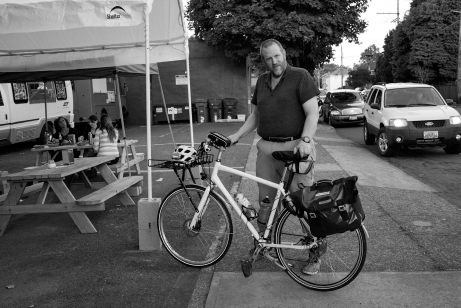
Scott Batchelar, the “mayor of Food Cart Town.”
When he and I sat down for this interview, he confessed to me that sometimes in the middle of a conversation, he will realize that he is being obnoxious, and that saddens him. During that interview, I said, “Scott, do you ever realize that you are sometimes being really loud?” His honest reply was, “I am loud sometimes?” I told him, “Yep, sometimes you are very loud.” He had no idea.
If you are ever at food cart and come across a guy with a bike who is telling everyone within earshot that that particular food cart is a great one, you might have just found my friend Scott. First, listen to the man. If Scott says a food cart is worth eating at, it is. Second, go introduce yourself and invest ten or fifteen minutes listening to Scott’s wonderful food cart stories.
Belonging
It is my opinion that Scott’s love of food carts is all about the community he experiences. During our interview, Scott said three things that deeply touched my heart. I heard these sentences not as a food writer but as the parent of a disabled child: “I go to the food carts for the people and the community…Food carts let me be okay with myself…Part of the reason I go to food carts is for the community, because I am accepted for who I am.”
Let me close Scott’s chapter with this story. He teared up when he relayed it to me while we were sitting in Teote, a Latin American restaurant specializing in street food that Scott loves. (Incidentally, Teote started out as a food cart.)
Scott’s birthday is September 21, and on that day in 2011, he was asked by Bo Kwon, founder of the KOi Fusion food cart empire, to stop by the Mississippi Marketplace Food Cart Pod. (Scott loves Bo and considers him to be one of his heroes.) When Scott got to Mississippi Marketplace, Bo presented him with a cake. But not just any cake; this cake was in the shape of a bicycle. “The cake was shaped like my bike,” Scott said, his voice wavering a bit.
If the Portland food cart scene were a town, Scott would be the beloved mayor.
ROGER GOLDINGAY: THE MISSISSIPPI MARKETPLACE AND CARTLANDIA FOOD CART PODS
Roger and his wife, Carol, moved back to Portland in 2002. They left Malibu, California, to come to Portland. Some may shake their heads at such a choice. Those of us who know and love Portland completely understand someone choosing Portland over anywhere in California.
Roger did share with me that it was not the weather that drew him back to Portland. It was the culture we have here. “It was laid-back, less judgmental, more easygoing.” He added, “Portland has a creative vibe that was very attractive…every time I read about Paris in the early 1900s, Portland came to my mind.”
I said “moved back to Portland” because Roger first lived in Portland in 1975. There is an amazing little-known fact about Roger.
Soccer
Roger was a professional soccer player in the 1970s. In 1974, the first team to ever bear the name “Seattle Sounders” took the field for the first time. They were part of the North American Soccer League (NASL). Roger Goldingay played for the Sounders that inaugural season.
In 1975, the first of four teams to bear the name Portland Timbers took the field in their inaugural North American Soccer League season. Roger Goldingay was on that team as well. He is the only person to have played for both the Sounders and the Timbers during both of their respective inaugural seasons.
Portland is known for a number of things, including the Timbers and food carts. Given Roger’s love for Stumptown, it seems fitting that he would have a noted place with two of our most beloved institutions.
Revitalizing Mississippi Avenue
When Roger came back to Portland in 2002, he moved to Mississippi Avenue, and for a number of years, he worked to buy the lot on the corner of North Mississippi Avenue and North Skidmore. By the time he was finally able to purchase it, the economy had crashed, and the lenders who were going to help him develop that piece of property were nowhere to be found.
Roger was able to get a loan from the Albina Opportunities Corporation to put in a “parking” lot with water and electrical hookups for food carts, as well as renovate the dilapidated building that was an eyesore. Roger figured that in the crashing economy, there would be a number of people who would be forced into considering self-employment, and he correctly surmised that some of those people would consider starting a food cart.
Roger’s vision for that lot on the corner of North Mississippi Avenue and North Skidmore was to put in a premier food cart pod that featured some the best food carts in Portland, as well as have a great bar in the building that he was renovating.
When he was getting ready to open the Mississippi Marketplace Food Cart Pod, Roger took more than seventy applications for ten spots. Roger’s goal was to pick the best carts possible. The first two food carts that Roger said yes to were Garden State (a now-defunct but legendary Portland food cart) and the Big Egg. Rogers remembered meeting Elizabeth and Gail with the Big Egg and tasting their food. He knew that they would make it.
The Mississippi Marketplace Food Cart opened in the summer of 2009, and Prost!, a neighborhood pub that specializes in German beer (or should I say “bier”), opened in October that same year. In my opinion, Roger has done a magnificent job implementing his vision. Prost! has great beer, and it provides both outdoor and coveted indoor seating for food cart fans. The lineup of food carts at Mississippi Marketplace is consistently stellar.

Roger Goldingay, founder of Cartlandia and the Mississippi Marketplace.
Roger remembered North Mississippi Avenue before it became a highly desired Portland location. It is very gratifying to Roger to know that he has played a small role in the revitalization of that part of Portland.
Revitalizing 82nd Avenue
With the positive changes that have occurred on North Mississippi Avenue since 2002 on his mind, Roger bought a lot on 82nd Avenue in October 2010 with the intention of putting in a food cart pod there. Right away, Roger had doubters. 82nd Avenue has/had a stigma, and people were not sure that a food cart pod could work out there.
Roger saw what others couldn’t. He saw parking, bus service, the Springwater Corridor bike trail only three hundred feet away and the more than thirty-five thousand cars that drive past on 82nd every day. The Cartlandia Food Cart Pod opened in May 2011, and it is home to about twenty-five food carts.
In the spring of 2014, Roger will be opening a pub at this pod. Like Prost!, this pub will have indoor seating and will welcome patrons to bring their food cart food in with them.
The Landlord
While I like Roger, I would be remiss if I did not address the reality that not everyone involved in the Portland food cart scene likes him as well. Roger is a landlord, and I know firsthand that sometimes the landlord makes decisions that the tenant is not fired up about.
When we talked about what it’s like to be the landlord of more than thirty food carts at a time, Roger told me that it is like herding cats. I believe him. Being a landlord to food carts is not a job that I would want.
It is my opinion that Roger feels a heavy and serious responsibility to look out for the food carts to which he rents. He loves it when one of “his” food carts succeeds, and his heart aches when one of his food carts goes out of business.
Talk to Roger
If you are with a municipality that is thinking of implementing the Portland food cart model that we have here in the city of Portland and in Multnomah County, Roger is one of three people featured in this book that I would encourage you to talk with. Roger knows firsthand how food carts can play a pivotal role in revitalizing an urban neighborhood, and he has perspectives and wisdom that you would do well to consider.
Portland Is Better Off Because of Roger
As a food cart fan, I am very glad that Roger had the vision to start the Mississippi Marketplace Food Cart Pod and the Cartlandia Food Cart Pod. There are a number of small business owners who would not be where they are now if it were not for Roger and his pods. If your food cart started at one of his two pods, you owe him a debt of gratitude. Portland is a healthier and more appealing city because of Roger Goldingay.
Roger, I tip my food cart hat to you, and I thank you for all that you have done for my beloved city and for the Portland food cart scene.
TIM HOHL AND TERRY TRAVIS: FRIDAY IS OUR FAVORITE DAY OF THE WEEK
Tim Hohl and Terry Travis have introduced the people of Portland to scores of food carts though the “Food Cart Friday” segment on First Edition, the radio show they host on KPAM 860.
We’ve Never Had a Bad Meal
First Edition launched in the spring of 2011, and by the summer of 2011, they had added a weekly food cart–centric segment. Most weeks, a food cart owner comes to the radio station and talks about their cart and brings one of their signature dishes, which Tim and Terry sample live on the air.
Tim and Terry have enjoyed more than one hundred early morning food cart meals, and they are always pleasantly pleased by how good the dishes are. Terry is very impressed that each and every dish has been wonderful.
“I live in the greatest place on Earth,” said Terry Travis, who grew up in Vancouver, Washington, and graduated from Columbia River High School. Terry’s career took her to places like Boston, Brooklyn and Seattle. When the chance came to come back to Portland, she jumped on it. Reflecting on that move, Terry said, “I was so glad to be coming back to Portland.”
One of Terry’s cherished hobbies is riding her bike. “I still remember the first time I got to ride my bike without training wheels—I felt so free!” She said that she likes to ride a long ways…slowly. One of her favorite bicycle trails is the Springwater Corridor—particularly the section that heads out toward Gresham. Out there, she encounters stunning vistas that have Mount Hood in the distance smiling down at her.
Tim Hohl was born in Michigan and lived in Detroit until his family moved to Portland when he was ten years old. He stayed in Portland through high school, graduating from Jesuit. “Portland is home,” said Tim. Right out of college, Tim started in radio here in Portland. Eventually, his radio career took him north to Seattle. Thirteen years ago, the doors opened for him to come home. Portland is where his heart is. Tim really appreciates that we have both the beach and the mountains so close. He loves it that he can leave the parking lot at work and be on his skis in less than ninety minutes.
Tim’s favorite hobby is beer, and he loves the Portland beer scene. “Beer is an art form,” he said. His eyes danced when he told me that “in Portland you can have a different beer, every day, for 365 days, and each one will be from a local brewery and each one will be great!” Not only does he enjoy having a pint at one of Portland’s many local pubs, Tim is a home brewer as well. He would love to someday open up his own local brewery.
I Am Out of Meatballs but I Will Fix You Up
Tim told me this delightful story about his daughter and food carts. When Tim’s daughter does not have school on Fridays, she will come into the station with him to check out “Food Cart Fridays.” She was in the station the day that Jason Moreno, owner of J Mo’s Sandwich Shack Food Cart, brought in the Dirty Mo. She loved it! I can’t blame her, as the Dirty Mo is one of my favorite sandwiches. It has spaghetti and cart-made meatballs on really good garlic bread. Honestly, when I first heard about the Dirty Mo, I was not really excited. Spaghetti and meatballs on a sandwich didn’t sound that good to me. However, when I took my first bite, I was enraptured.

Tim Hohl and Terry Travis, hosts of KPAM 860’s First Edition.
From that particular “Food Cart Friday” on, Tim would have to take his daughter to J Mo’s so she could get a Dirty Mo. One day, something awful occurred, followed by something wonderful. Jason was out of meatballs, and consequently, the Dirty Mo could not be made. Tim’s daughter was crushed. Jason, being the resourceful chef that he is, said, “Don’t worry. I will fix you up!” Jason whipped up an eggplant Parmesan sandwich. Tim’s daughter took one bite and bam—she loved it! Culinary crisis averted. That sandwich is now on the menu.
We Get to Celebrate a Food Cart Every Friday
Tim and Terry look forward to the amazing food they enjoy each week during their “Food Cart Friday” segments, and they have come to love hearing the stories of the inspiring people who start food carts. As Terry told me, “Friday is our favorite day of week!”
BRETT BURMEISTER: TELLING PEOPLE ABOUT THE COOL THINGS I FIND
Brett Burmeister is the managing editor of FoodCartsPortland.com. Brett has been writing for this website since just before the beginning of 2009. Brett has written more than six hundred food cart articles, eaten at more than five hundred food carts and dined at food carts more than one thousand times. The man knows food carts!
For the past five years, Brett has been Portland’s on-the-street food cart correspondent reporting to us about all that he finds. The Portland food cart scene has grown and flourished in the city. It is my opinion that Brett is one of the people most responsible for that, and I for one am very grateful for his efforts.
Through the FoodCartsPortland.com website, Brett has made it possible for the average person to find out about food carts. He has made food carts accessible. Each time he writes about a food cart, he includes what he calls “the data”—the location, the hours, the story and a sample menu.
Before FoodCartsPortland.com
Brett began writing back in 2005. He started a blog called “Walking in Portland,” and his first post was January 19, 2005. He wrote about the cool stuff he found as he walked around Portland. In 2007, Brett was recruited to write for Portland Metblogs, which he did until June 2008.
Bret wrote a little about food carts for both of those blogs, and in the winter of 2008, he was recruited to come write for FoodCartsPortland.com. Brett had found his niche. He loves to find cool stuff and tell others about it. Going around Portland, finding food carts and then telling us about them was right up his alley.
Tours, Consulting and Events
Not only does Brett write for FoodCartsPortland.com, he also has three other food cart–related services that he provides. He provides walking tours of food carts, during which you get small bites from four food carts, and as you traverse from cart to cart, you get the chance to hear Brett tell you about a number of very interesting food cart topics.
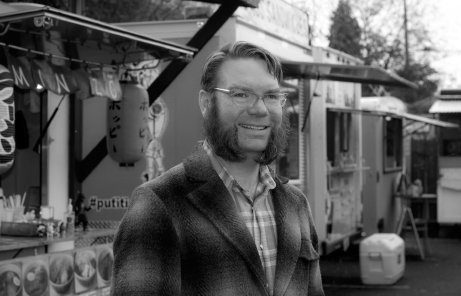
Brett Burmeister, managing editor of FoodCartsPortland.com.
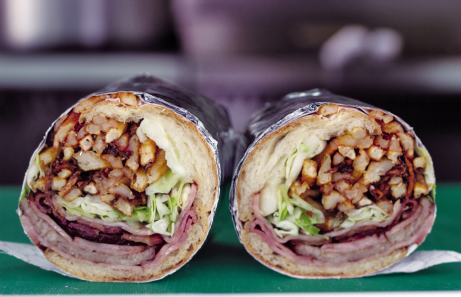
A Big-Ass Sandwich.
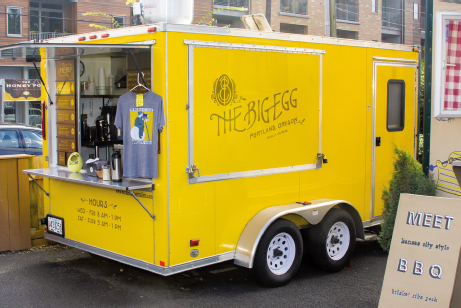
The Big Egg Food Cart. Photo by Ken Wilson.
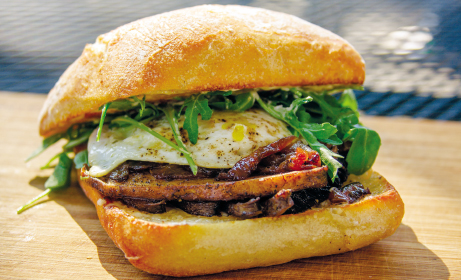
The Arbor Lodge Sandwich from the Big Egg Food Cart. Photo by Ken Wilson.
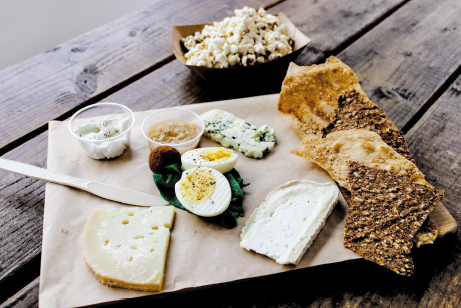
The Cheese Lovers’ Oregon Cheese Plate from the Cheese Plate PDX Food Cart.
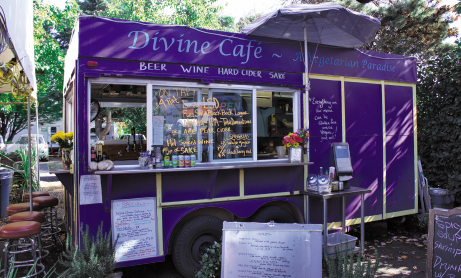
The Divine Café Food Cart.
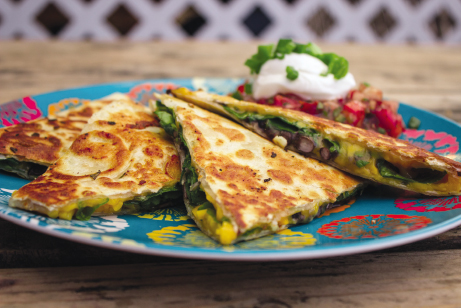
The Killer Quesadilla from the Divine Café Food Cart.

A fried egg with Magic Egg Dust from the Fried Egg I’m in Love Food Cart.
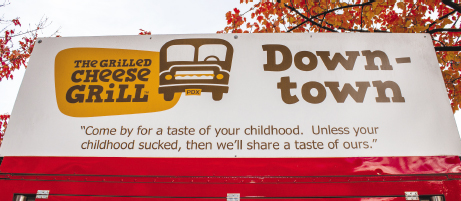
The Grilled Cheese Grill Food Cart tagline.
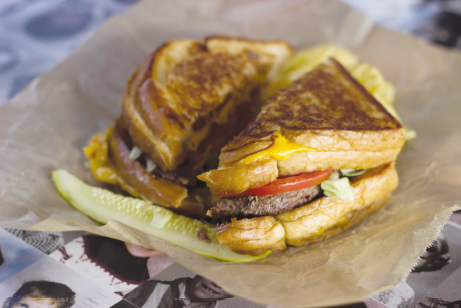
The Original Cheesus from the Grilled Cheese Grill Food Cart—two grilled cheese sandwiches, one with pickles and American cheese and a second with grilled onions and Colby jack. In between these two sandwiches are lettuce, tomato, ketchup, mustard and a  -pound burger. Oh baby! Who is your big grilled cheeseburger daddy?
-pound burger. Oh baby! Who is your big grilled cheeseburger daddy?
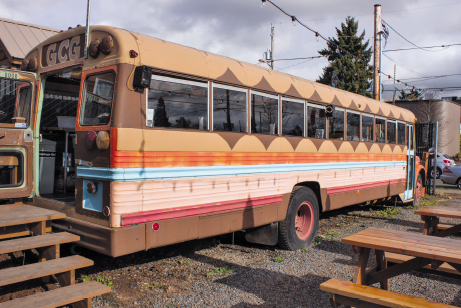
The school bus from the Eleventh and Alberta Grilled Cheese Grill Food Cart.
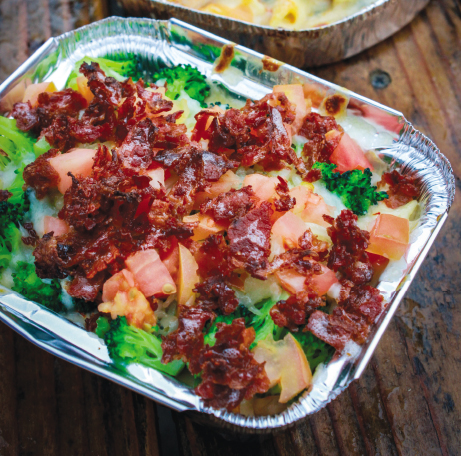
Mac and cheese from Herbs Mac & Cheese Food Cart, topped with broccoli, bacon and tomato. Photo by Molly Woodstock.
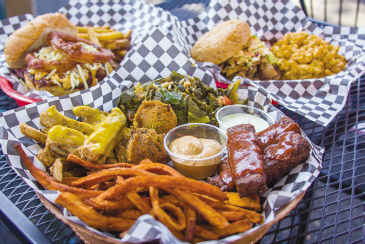
The Sampler Platter from the Homegrown Smoker Vegan BBQ Food Cart. Photo by Ken Wilson.
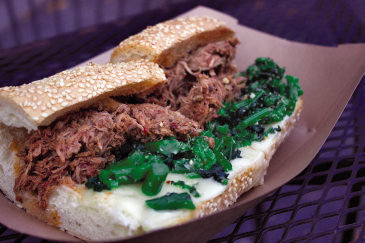
The Federal from the Italian Market Food Cart—Italian pork with sharp provolone and broccoli rabe.

Khinkali from the Kargi Gogo Food Cart—a traditional Georgian stuffed beef and pork dumpling.

A perfect latte from Olé Latte Coffee Food Cart.

The PDX Six Seven One Food Cart.
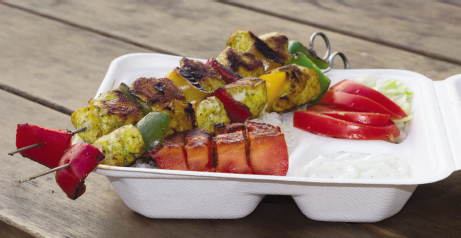
Chicken Kabob from the Ramy’s Lamb Shack Food Cart.

Super Lamb Gyro from the Ramy’s Lamb Shack Food Cart.
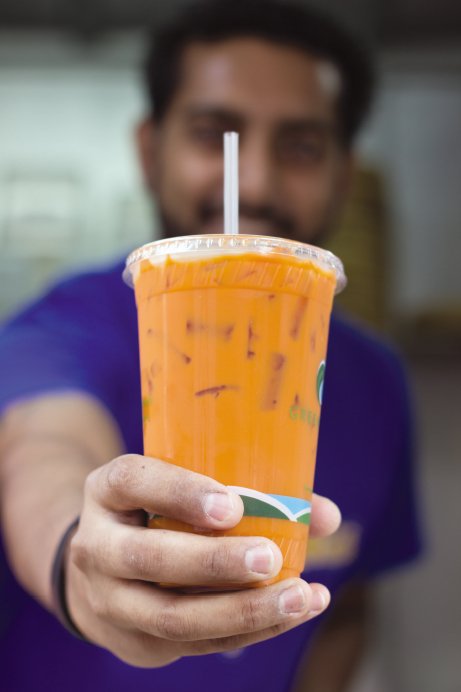
Liquid Gold Thai Iced Tea from Stumptown Dumplings Food Cart, held by Nimesh Dayal.
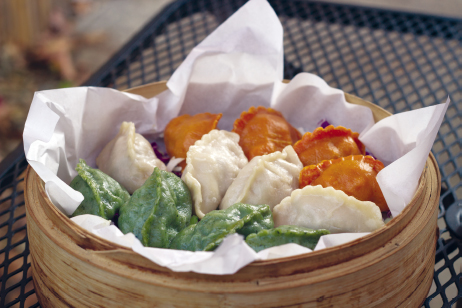
Dumplings from Stumptown Dumplings Food Cart—Cheeky Chicken, Pompous Pork and Sassy Spinach.
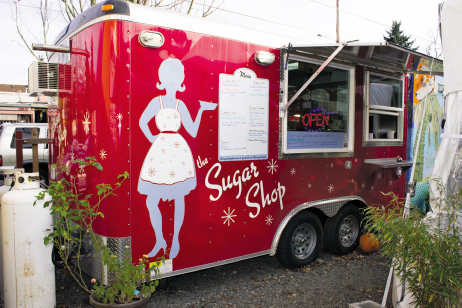
The Sugar Shop Food Cart.
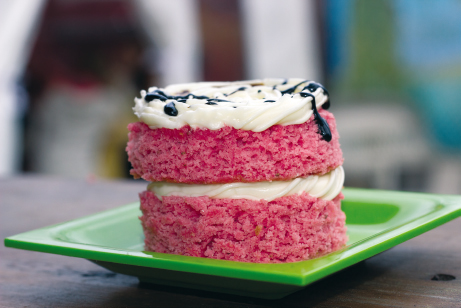
Strawberry cake topped with basil buttercream and balsamic drizzle from the Sugar Shop Food Cart.

The Hot Chick from the Tiffin Asha Food Cart—Pakora fried chicken drizzled with black cardamom-infused honey, pickled greens and creamy yogurt cheese wrapped in a cart-made dosa.
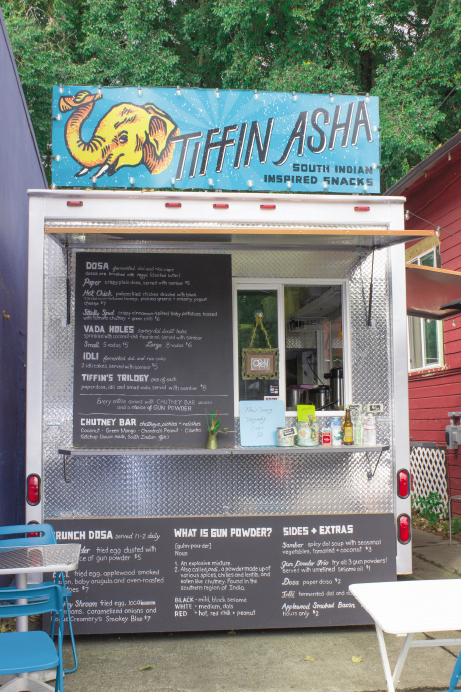
The Tiffin Asha Food Cart.
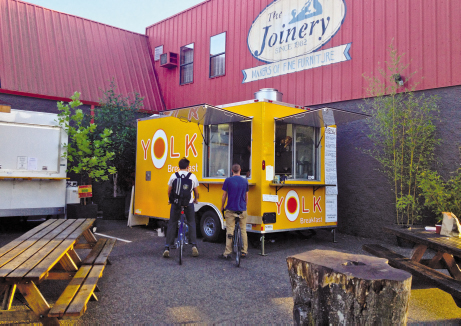
The Yolk Food Cart.

The Brother Bad Ass from the Yolk Food Cart—maple-glazed pork belly, Beecher’s cheddar cheese, an over-easy egg, greens and Dijon mustard between two slices of Little T American Baker pretzel bread.

The Whiffies Fried Pies Food Cart.

Red velvet cupcake from the Retrolicious Food Cart.
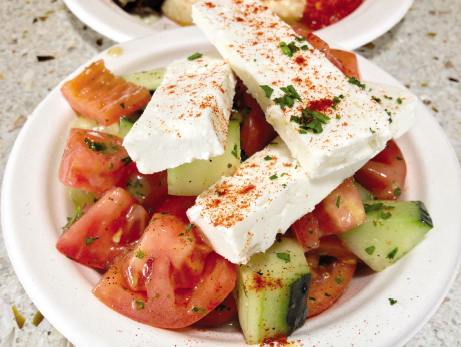
Greek salad from Ramy’s Lamb Shack—tomatoes, cucumbers and feta cheese.

The PB and J Fries from the Potato Champion Food Cart. The fries are topped with Potato Champion’s peanut satay sauce and chipotle raspberry sauce.
Brett also does a little consulting. If you are thinking of starting up a Portland food cart, I encourage you to have at least one conversation with Brett. Bring a pad of paper and be prepared to take notes. If you are with one of the many municipalities that come to Portland to find out about the food cart scene, Brett is one of three people with whom you need to sit down and talk. Schedule a consultation with him and ask him to talk with you about O’Bryant Square.
Lastly, Brett works with a number of Portland’s truly mobile food carts, and for a fee (paid by the food cart owner), he can help you get a genuine Portland food cart to your event!
Brett’s Favorite Food Cart
One question that Brett gets asked repeatedly is, “What is your favorite food cart?” He smiles when he tells the person that they are asking the wrong question. He goes on to say that the better question is, “Where would you take a guest from out of town?” Brett was recently asked to provide a list of the top ten food carts in Portland. He began making that list but put his pen down when he realized that the list already had forty carts and still more to go.
Food Cart Future
I asked Brett what some of his next steps will be regarding food carts. He wants to do what he can to help further the cause of street food, and he would love tell people across the country “the glory of the pod idea.” Brett has seen with his own eyes how food cart pods can improve a city and rehabilitate a neighborhood. He has a passion for food carts, and Portland is better off because he is willing to tell us about the cool stuff that he finds out there on the streets of Portland.
RICK HUMPHREY: HIS CARD IS IN MY WALLET
Rick Humphrey is the assistant parts manager at Curtis Trailer, and if you own a Portland food cart, it is very likely that you have his card in your purse or wallet. Rick has been at Curtis Trailer since 2007, and he has been servicing food carts for many years. He has assisted many food cart owners over the years, and he has an excellent reputation among food cart owners.
“What Is a Food Cart?”
Prior to 2007, Rick worked at the now-defunct Gresham RV. It was while he was working there that he first encountered a food cart owner. Rick had a customer buy a water pump. This same customer came back a few months later for a second water pump. When this same customer bought a third water pump just thirty days later, Rick’s curiosity got the best of him, and he asked this gentleman what he was doing with the water pumps. Rick was told, “I use them in my food carts.” Rick then asked, “What is a food cart?”
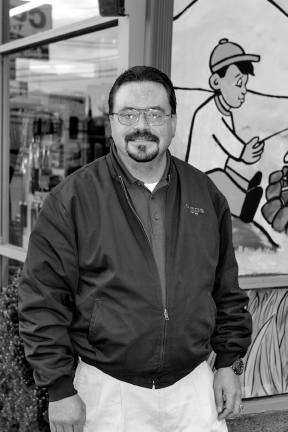
Rick Humphrey, “the Food Cart Guy.”
Rick had been selling water pumps to Saied Samaiel, the founder of Aybla Grill, a food cart business that today has five locations. Saied was excited to tell Rick all about the Portland food cart scene. Rick and Saied still do business together to this very day. The second food cart owner that Rick ever met was Rose Guardino, owner of the Divine Café Food Cart.
The Floodgates Opened
Rick did not do very much business with food cart owners while at Gresham Trailer. The owners did not really want to sell to food cart owners, preferring to stick with people who own RVs for recreational use. Once Rick moved over to Curtis Trailer in 2007, he was encouraged to go out to the food cart pods, hand out his card and help as many food cart owners as he could. Rick told me that once word got out that he was a resource food cart owners could depend on, “It was like the floodgates opened.” Many food cart owners would show up to see him and get his assistance.
A Valuable Resource for Food Cart Owners
Rick has become well versed on the health department regulations for Multnomah, Clackamas, Marion and Hood River Counties. Food cart owners regularly turn to Rick for his advice, counsel and, of course, parts! The items for which food cart owners depend on Rick include holding tanks, water pumps, water heaters, concession windows and doors, awnings, electrical cords and hasps (latches used to keep doors locked).
Rick Humphrey, the Food Cart Guy
People began calling Rick “the Food Cart Guy,” and he eventually embraced that moniker. Today, Rick has a “TheFoodCartGuy” Twitter account and Facebook page. Rick serves the Portland food cart community at a tremendous level. Many times, he has taken late-night calls to help food cart owners in need. I mentioned Rick in a conversation I was having with Jeff Mendon, owner of the Bento Box Food Cart, and he smiled and said, “I have his card in my wallet!” Every successful Portland food cart owner I know has Rick’s card. Nuff said.
BRYAN SEBOK: MAPPING THE MOBILE FOOD MOVEMENT
Bryan Sebok spent most of 2013 filming the feature-length documentary Cartography: Mapping the Mobile Food Movement, and he plans to premiere this film in late 2014.
Bryan moved to Portland in 2009 to become a professor of media studies at Lewis and Clark College. Bryan did his undergraduate studies at NC State University. He graduated NC State with a degree in mass communications and film studies. He got his masters in film studies at Emory University and has a doctorate in media studies from the University of Texas–Austin. There is a reason why Bryan is so well spoken and erudite.
Bryan also loves film. He has liked movies as long as he can remember. When he was baby, his nursery overlooked a drive-in theater, and his mother told of nursing him in that room while watching movies out the window. During Bryan’s childhood, he got to go to the dollar theater and see a movie two to three times per week. Growing up some of his of his favorite movies were The Goonies, Gremlins and One Flew Over the Cuckoo’s Nest.
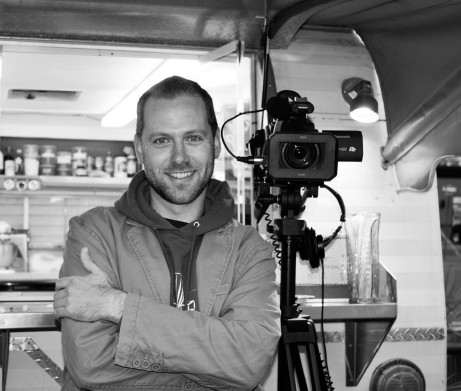
Bryan Sebok: professor, filmmaker and food cart fan.
Visually Telling the Portland Food Cart Story
Once Bryan moved to Portland, he saw all of the food carts, and given his academic background, he did some research on them with a focus on the impact that food carts have culturally, industrially and economically. Bryan’s research revealed lots of interesting data, and he found that the people who owned Portland food carts had some incredible stories. Given his love of film, Bryan began to ask himself, “Why am I not making a documentary about this amazing phenomenon?” Bryan’s goal was to visually tell the story of Portland’s food carts.
Bryan began filming on January 1, 2013, and he filmed at hundreds of food carts. As Bryan sat down with food carts owners and interviewed them on camera, he realized how important the story was. He observed firsthand how food carts have had positive and long-term effects on the community as a whole and on the neighborhoods in which they are located.
Portland: A Model for Mobile Food Success
Bryan’s year of research and filmmaking led him to conclude that Portland is a model for mobile food success that can be adopted by municipalities in other parts of the country. If you are with one the many municipalities that regularly visit Portland to investigate our food cart scene, I highly encourage you to sit down with Bryan and consult with him.
Food Cart Culture vs. Food Truck Culture
Bryan has learned that one of elements that is part of the Portland mobile food success story is something that he defines as the difference between a food cart culture, where the cart generally stays in one place, and a food truck culture, where the truck is mobile and does not have a set location.
College Students
Bryan is the kind of teacher who cares about students, and twelve of his students got to take part in the making of this documentary. I ran into Bryan a number of times throughout 2013, and I got to know two of those students: Sofia Alicastro (who served as production manager) and Alia Al-Hatlani (who worked on social media and design).
Cheering One Another On
Over the course of the year, one of the most pleasant surprises that Bryan found was that there was less competition and more community among food cart owners than he had expected there to be. The community spirit that exists among many food cart owners touched him. Bryan himself is a food cart fan. He has many favorite food carts, including the Egg Carton, Moberi and the Smaaken Waffle Food Cart.
Go See This Movie
I enjoy sports radio, and Colin Cowherd occasionally talks about how much he likes a good documentary. Cartography is going to be right up Colin’s alley. It has very interesting stories, and it is set in Portland, a town that Colin knows well. When Cartography comes out, go see it! It is going to be a compelling, enjoyable and insightful documentary.
What’s Next: Bryan has to get the editing completed and shepherd Cartography through a film festival season. Once all of that has been completed, Bryan would love to make a documentary on the craft brewing culture. Portland definitely has its share of craft breweries, too. I hope that Bryan is able to find college students willing to help make a film about beer—that could be tough.
ON MANY FOOD CART MENUS: CARLTON FARMS
I was at the Burger Guild Food Cart in the spring of 2012 when Carlton Farms first came onto my radar.
The Burger Guild Midwest Pork Tenderloin Sandwich
Mike at the Burger Guild makes this extraordinary Midwest pork tenderloin sandwich. The pork tenderloin is breaded, deep fried and topped with lettuce, onion, pickles and mustard. This sandwich is huge and incredibly good. The pork is so tender and flavorful that you want to eat another as soon as possible.
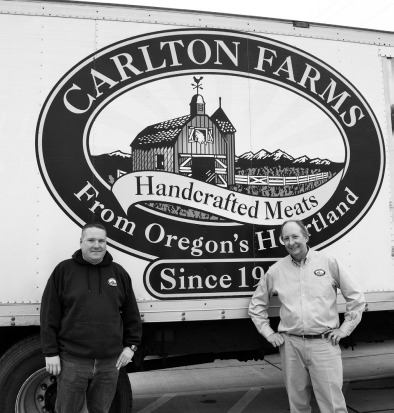
John Duyn and Jake Burns of Carlton Farms, two guys who love and know their sausage.
I noticed that on the menu, Mike was prominently featuring that he used Carlton Farms pork. As the year progressed, I saw a number of other food carts stating on their menu that they used Carlton Farms meats. Food carts were doing this to make it clear to their customers that they were using top-shelf meat from a superb local producer. It was one of the ways that a food cart could set itself apart and convey that it used first-class ingredients.
I could taste the difference, and whenever I saw that Carlton Farms was on the menu, I knew that I was in for a great meal. When it came time to write this book, I wanted to know more about this business that so many food cart owners were attaching to their brand. Given who I am, I wanted to get to know the story of this company and the stories of the people there.
John and Jake
I was lucky enough to meet and talk extensively with two of the amazing people who make the magic happen at Carlton Farms: John Duyn, president and CEO, and Jake Burns, VP of operations. Carlton Farms was started in 1956 by Henry “Hank” Duyn. In 1958, Carl Duyn, Hank’s brother, joined the company. In 1974, John Duyn was recruited to come to Carlton Farms to be the general manager. Under John’s leadership, this local family business has flourished to become a very well-known and prominent local brand.
John’s Food Cart Tour
I first met John in October 2013, when I was privileged to take him on a food cart tour. We visited four food cart pods and ended up eating at seven different food carts. It was quite fun to see how excited food cart owners were to have the president of Carlton Farms at their food cart.
John earned a tremendous amount of my respect that day. He was very kind and was genuinely interested in each person we met. The encouraging way he interacted with the small business owners we met with that day was impressive.
It was apparent that John loved food and also that he was quite knowledgeable about many different types of cuisine. One minute he was conversing with Paolo from the Burrasca Food Cart about Italian food and a Tuscan butcher they both happened to know, and the next he was talking with Alec Harry from the Guero PDX Food Cart about Latin American cooking. It was also clear that John takes great pride in the fact that his company produces high-quality meats. It takes longer and costs more to do that, but for those people who want a top-shelf product, people like food cart owners, the extra investment is more than worth it.
It was John’s grandfather Girard who instilled the value for making a high-quality product into the Duyn family. Girard “Jake” Duyn taught both John’s father and his uncle to have an old-world charcuterie approach to meat.
“I love the science of meat and spice,” said Jake Burns. It was that old-world aesthetic that caused Jake to agree to come work at Carlton Farms eleven years ago. Most large U.S. producers make bacon in about twenty-four hours. The bacon at Carlton Farms takes two to three weeks to make. When Jake learned that Carlton Farms followed the longer process, and when he saw the cure cooler, he knew that he wanted to be a part of this very special company.
Jake loves working at Carlton Farms. He graduated college with a degree in meat science, and he has loved that business ever since. If you are ever lucky enough to catch up with Jake and talk with him about meat and spice, his passion will be palpable and you know that he works for the right company.
Two Guys Who Love Sausage
While I was interviewing both John and Jake, I asked them which Carlton Farms product was their favorite. Both of them enthusiastically proclaimed that it was sausage. Not only does Jake make sausage at work, he also makes it at home in his own kitchen. John loves sausage as well, and he is also a hot dog aficionado.
The workday starts very early at Carlton Farms. Both John and Jake shared with me that they love to grab a cold hot dog for a snack during early morning breaks. It warmed my heart to discover that John and Jake both love sausage. Why would that matter to me? That fact told me something important about Carlton Farms. Let me explain it this way: Shannon and Autumn own the Sugar Shop PDX Food Cart. This is a dessert cart, and that means that both Autumn and Shannon do a lot of baking. I mean a whole lot of baking, hours and hours of it. The thing is, they both absolutely love to bake, and you can tell that when you enjoy one of their amazing desserts.
The same is true when you enjoy meat from Carlton Farms. You can taste the care and the joy that goes into what it produces. I want to buy my sausage, ribs, pork, beef and bacon from a company where those in management love sausage the same way that Autumn and Shannon love to bake.
Truly Handcrafted
By the way, I have been to Carlton Farms, and I was privileged to get to see behind the scenes. When they say “handcrafted,” they are serious, and you can taste that difference in every bite. In my opinion, the food carts that feature Carlton Farms on their menus are making a very wise business decision.
BRIAN WILKE AND ERIC STROMQUIST: BEING A NICE PERSON IN THE HOSPITALITY BUSINESS
I have been working with food cart owners and writing about the Portland food cart scene for two years now, and in that span of time, I would occasionally have a food cart owner gratefully talk about a culinary school chef who trained them named Brian Wilke.
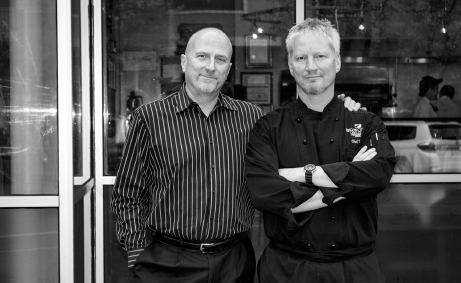
Brian Wilke and Eric Stromquist of the Oregon Culinary Institute.
I also have spoken to many chefs who have gone to culinary school, and while they always think that it is a very good idea for someone who wants to cook professionally to attend culinary school, they always say that someone should go to a “good” culinary school. They then either imply (or, more often than not, directly say) that not all culinary schools are ones you would want to attend. I decided to find out for myself who this Brian Wilke guy was and what makes for a “good” culinary school.
Two Nonnegotiable Conditions
Brian Wilke and Eric Stromquist started Oregon Culinary Institute in the spring of 2006. Prior to starting OCI, they had each spent ten years working at another Portland-area culinary school. They had each started out as instructors, and before they left, Brian had become executive chef and Eric the VP of academics. Their previous culinary school ended up going though a corporate merger, and as all mergers do, this one brought a number of changes. Those changes led both Eric and Brian to part ways with that institution.
Pioneer Pacific College approached them and asked, “How would you like to start a professional culinary program for our college?” Both Brian and Eric initially said, “No thanks.” Pioneer was persistent, certain that it had found the right people for the job.
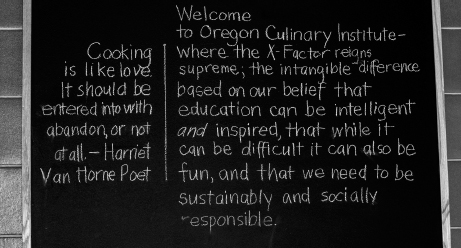
“Cooking is like love. It should be entered into with abandon or not at all,” at the Oregon Culinary Institute.
Brian and Eric started having discussions with each other, and they began to remember what had first led them to fall in love with culinary education. They then said to Pioneer, “We have two nonnegotiable conditions: one, you can’t tell us how to do it, and two, we keep small class sizes.” Pioneer said yes to both conditions, and they began to build OCI.
Both Brian and Eric are deeply committed to small class sizes. They believe that in a hands-on environment, you need to have access to your instructor. Brian emphatically told me, “You can be in a four-hundred-person class for English. That does not work for cooking.”
Two Very Different Skill Sets: Cooking Great Food and Teaching Others to Cook Great Food
Eric shared with me that it took him twenty years to learn that what he liked best about the restaurant business was being a customer. His passion, as well as Eric’s, is teaching others first how to make great food and then preparing them for a career in the culinary business. Brian and Eric have each worked in the restaurant business their entire adult lives, and at OCI, they were allowed to design a curriculum based on what they know their students will need out there to be successful.
One-Third of the Incoming OCI Students Struggle with Math
Brian loves to see the students who struggle with math reach a point where they not only know that they made a really great plate of food, but that they also know how much that plate of food costs and how much they would have to sell that plate of food for to make a profit.
You Have to Be a Nice Person
Two things really impressed me about OCI. The first was why the students do not have nametags. Brian and Eric expect the instructors to know their students’ names, and that fits hand in glove with the second thing that really impressed me. If you want to be an instructor at OCI, you have to be a nice person. If during the first interview they get the sense that you are not a nice person, you won’t get a second interview.
Eric and Brian see no place for the stereotypical rude and unpleasant chef in the hospitality business. As Brian said, “It’s the hospitality business. You have to be a nice person.” Hearing Brian say that reminded me of what John Duyn, president and CEO of Carlton Farms, said about Paolo, the owner of the Burrasca Food Cart. John said that one of the reasons why Paolo would make it as a restaurant owner (aside from his amazing food) is that Paolo has experience working the front of the house. John went on to say that he has met a number of chefs who were mean, awful people, and they can get away with that because they are hidden back in the kitchen, where the customers don’t see them.
People who work the front of the house quickly learn that you need to have good people skills to keep the customers coming back. Great food alone won’t do that.
What I Would Tell My Kids
If one of my kids wanted to start a food cart, and they asked me what path I would suggest they take, here is what I would say. I would ask them if they wanted to simply start a food cart that would be around for a year or two, or if they wanted to start a culinary brand that would have long-term success.
If they answered the former, I would encourage them to work in restaurant for at least six months, to work in a food cart for at least six months, and then, if after doing both of those they still wanted to move ahead, I would tell them to go to a “good” culinary school like OCI.
“We teach bakers and cooks to how to make money doing what they love,” said Eric. Brian added, “Our joy at OCI is equipping someone to take the passion in their heart for cooking and express it on a plate.” I have no doubt that OCI is one of those “good” culinary schools that my friends who have been to culinary school encourage others to attend.
When You Go: They actually have a restaurant at OCI, where you can enjoy a three-course lunch or a four-course dinner made by the students. I have eaten there, and the food is wonderful.
DOING AWAY WITH THROWAWAY: GO BOX
Laura Weiss started GO Box in July 2011 because of a conversation she had in March 2010 with a friend who worked at the City of Portland Bureau of Planning and Sustainability. GO Box is what makes it possible for you to get your downtown Portland food cart food in a reusable to-go container. As of the fall of 2013, the need for more than thirty thousand disposable containers has been eliminated because of the service that GO Box provides.
Found Her Calling at Thirteen
Laura grew up in New Jersey, and one day when she was thirteen years old, the New York Times had an article about the environmental tragedy and scandal that occurred in the Love Canal neighborhood in Niagara, New York. Laura remembered feeling upset and outraged that people would have to suffer the way they did in that situation.
Love Canal—a rather large neighborhood with many homes, schools and businesses—was built on top of a site where, years earlier, twenty-one thousand tons of toxic waste had been dumped. Subsequently, many tragic health problems emerged. This environmental disaster, along with a similar situation in Times Beach, Missouri, played a major part in leading to the Comprehensive Environmental Response, Compensation and Liability Act (CERCLA), commonly referred to as “Superfund.”
From that article on, saving the environment has been Laura’s focus. Both her education and career have been guided by her passion to do her part to save the environment. Laura did her undergraduate work at Rutgers, getting a degree in human ecology (environmental science), a master’s from UC Berkley in public health and an MBA in sustainable business from the Bainbridge Graduate Institute in Seattle, Washington.
Prior to starting GO Box, Laura worked for twenty-five years in environmental advocacy and policy, working in the corporate world for both state governments and nonprofits.
The Conversation that Led to a Business
Laura and her aforementioned friend from the Portland Bureau of Planning and Sustainability were talking about the roughly sixty thousand disposable containers that downtown Portland food carts use each month. Most of those containers end up in a landfill. Laura herself is a big fan of food carts. She had often wished that she could take her own reusable container with her when she ate at food carts; however, health codes prevent that. At the end of that conversation, Laura’s friend lamented, “If only there was a service that provided reusable containers that could be used at food carts.”
That thought got Laura’s mind working, and she began to think about starting her own business. She was aware of reusable containers made by G.E.T. Enterprises out of Houston, Texas, that would be perfect for food cart owners and customers. With a year, Laura had come up with an innovative business model using those very containers.
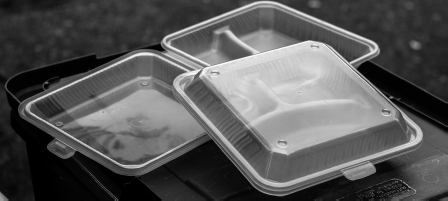
GO Box reusable to-go containers.
The Name
Laura came up with the name for her new startup while cross-country skiing. Laura said that she does her best thinking while skiing or riding her bike. The “GO” in GO Box stands for “Green Options.”
A Community-Facilitated Endeavor
Here is how GO Box works. A person invests eighteen dollars for a one-year subscription. People can purchase subscriptions online at the GO Box website or from participating food carts. You can find a list of the participating food carts on the GO Box website as well. With your subscription, you receive a GO Box token. When you show up at a participating downtown Portland food cart, you turn in your token with your order.
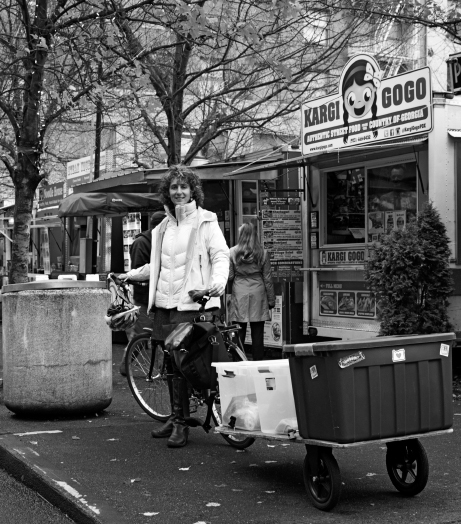
Laura Weiss, owner of GO Box.
Your order is served to you in one of the GO Box–provided reusable containers. When you are finished with the meal, you take your used GO Box container to one of the drop-off sites scattered throughout downtown Portland. When you turn in your used container, you get another token that you use the next time you visit a downtown Portland food cart participating in GO Box.
In addition to the public drop-off sites listed on the GO Box website, Laura has agreements with more than twenty other corporate partners that provide drop-off sites for those people who work in that particular office or building.
Laura can be seen riding around downtown Portland on her bike dropping off clean GO Box containers to food carts and picking up the used ones so that they can be washed and made ready to be reused. Laura takes the used to containers to one of the GO Box partners who help with washing and sanitizing the used containers. Laura has two downtown restaurants and one social service organization that help with this key step in the process: the Original, Bijou Café and the Transitions Project.
Work that Is Fulfilling and Fun
Laura loves what she does. She is making a difference for the environment, she gets to ride her bike for work, she gets to work in downtown Portland and she gets to work with food cart owners.
What’s Next: Laura hopes to expand GO Box to other parts of the country, and she is looking at providing other entrepreneurs with licenses to use the GO Box name and concept. A city does not need food carts to be able to sustain a GO Box business. GO Box will work in any dense urban environment that has lots of office workers and lots of takeout.
Food Writer’s Perspective:
PHIL SHEN
My fiancée, Kim Pham, and I started Behind the Food Carts (behindthefoodcarts.com) because we wanted to show the world the amazing food cart stories we were coming across. As professional photographers and videographers, we wanted to document food carts with the highest quality to match the hard work and love that goes into running a food cart.
Whenever we meet people who have visited Portland, the first thing they always mention is all the food carts they saw and ate at during their trip. Portland’s food cart scene is undoubtedly one of a kind in America. The city is friendly toward food carts, and the people are friendly toward eating at food carts.
The pods conveniently placed throughout the city immediately set Portland apart. These pods allow food cart vendors to have a more permanent home than their more mobile truck cousins and let you frequent your favorite carts over and over again without having to seek them out. Food carts are an ingrained part of Portland culture. This helps push the quality forward; Portlanders are sophisticated food cart consumers. With so many amazing food carts, their expectations are high!
The food cart scene as a whole in the United States is constantly evolving. I think now that we live in the San Francisco Bay Area, we’ve been able to see a different side of the food cart industry and get a fresh look at our time in Portland. We definitely appreciate the focus and specialty carts that you see in Portland. Sure, there are fusion carts out there, but the Portland carts we loved most were the ones focused on doing one type of food and doing it perfectly.
A good example is Nong’s Khao Man Gai. Nong and her Thai chicken over rice are a staple in the Portland food cart scene. It goes to show you what one dish done perfectly can bring to the table. It’s not about having a million options to choose from that are mediocre; it’s about that one perfectly comforting dish that keeps people coming back for more.
We love the opportunity that a cart can present to an aspiring entrepreneur. A new favorite of ours is Caspian Kabob. Victor saw that there wasn’t enough authentic Persian cuisine in the area and wanted to fill that gap (and our stomachs) with the real deal. I grew up in the Little Persia area of Los Angeles and ate some of the best Persian food you can find in the United States, so I was extremely excited to try his cart.
Victor wasn’t trying to put a radical spin on Persian cuisine or put Persian food into a burrito (which I bet someone is planning right now already). He simply wanted to bring an accurate representation of the food he is passionate about to a new audience. That’s the beauty of carts in Portland. They can take a risk and introduce audiences to a whole new cuisine that they didn’t even know they were missing.
We frequently get asked whether food carts are a fad. There are definitely more and more carts every year and, with that, more and more carts that go under as well. There is less room for error and more room for innovation and quality. But this is no fad; this is a lifestyle and a small business dream for a lot of chefs and owners.
It’s been an inspiration to us to talk to these owners about their passion and all the hard work they put in. Sixteen-hour days seven days a week can only be summed up as a labor of love. We’ve been honored to be able to tell their stories and focus on not just the food but also the down-to-earth, loving people we’ve met along the way who share a piece of themselves with us every day through their food.